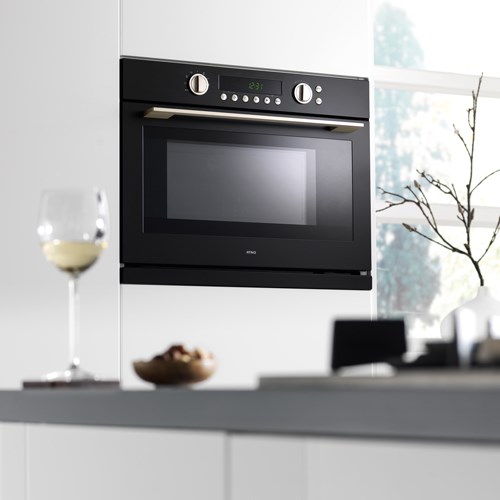Knowing how to clean your small kitchen appliances can help to make light work of what can otherwise be an arduous job. In this guide, we’ll provide you with some of the handiest hints and tips to get your clothes washer, dishwasher and oven sparkling clean.
How do I clean my clothes washer?
If you want to continue getting fresh bedding and great smelling towels and laundry out of your washer, you must give it some TLC. You can clean your washer in three simple steps:
- Remove the detergent drawer from the washer, take it apart as much as possible (while ensuring you can still put it back together!) and give it a good brush with a toothbrush to remove any stubborn dirt and build-up.
- Scrub the door seal with a sponge and some white wine vinegar to remove any mold hidden in the folds. If it’s still not mold-free, put some bleach in the detergent drawer and put your washer on the longest and hottest wash possible.
- Pour white wine vinegar into the detergent drawer and put it on a long, hot wash to clean away any dirt left in the machine.
Top tips
- Wipe the detergent drawer after every use and leave it open to dry out.
- Leave the door open after every wash to remove any condensation and allow the barrel to dry.
- Put white wine vinegar in the detergent drawer and put the washer on a hot wash once a month to keep your washer sparkling clean.
How do I clean my dishwasher?
A dishwasher can very easily become dirty, smelly and blocked over time, particularly if you do not rinse the dishes first. Here’s what you can do to prevent this common problem:
- Check for any food that’s caught in the filter and remove it. Then put some baking soda in the dishwasher and run a cycle.
- Remove any cutlery holders and spacers and place them in hot soapy water to soak.
- Wipe down the door seals with a cloth and some antibacterial spray.
- Top up the salt and rinse aid and be careful not to spill any salt inside your appliance. Always use the funnel provided.
- Make sure your dishwasher is draining properly after every wash. If it’s not, you likely have a grease or food build-up in the pipes that will need to be cleared by a professional - that’s us!
Top tips
- Use a specialist dishwasher cleaner every six months and follow the instructions on the label.
- Keep the salt and rinse aid topped up to ensure your dishwasher runs smoothly.
- Clear and rinse plates before putting them in the dishwasher to prevent food from clogging the filter.
How do I clean my oven?
Oven cleaning is a task most of us put at the bottom of our to-do lists. However, for hygiene, efficiency and good old peace of mind, it’s a job you should do every three months. You should also wipe down the oven door at least once a week. Here’s how to make quick work of even the dirtiest oven:

- Remove all the racks inside the oven and leave them to soak in hot soapy water.
- Set the oven to 460oF and leave for an hour. Then, when the oven has cooled but is still warm, wipe it down with a cloth and a small amount of non-toxic cleaning solution. Always wear rubber gloves when cleaning your oven.
- Rinse the racks thoroughly and place them back in the oven.
- Wipe off any residue with a dry cloth and allow the oven to heat up for longer before cooking your next meal.
Top tips
- Try to wipe down the oven door at least once a week to prevent a build-up of grime.
- Put a large roasting tray at the bottom of your oven to catch any drips and avoid burnt on food.
Contact the appliance repair specialists
Sometimes, your small kitchen appliances need more than a good clean. That’s when the appliance repair specialists at Go Assist can help. Request a free quote or give us a call on (800) 509-5917 to discuss a repair issue with our team.